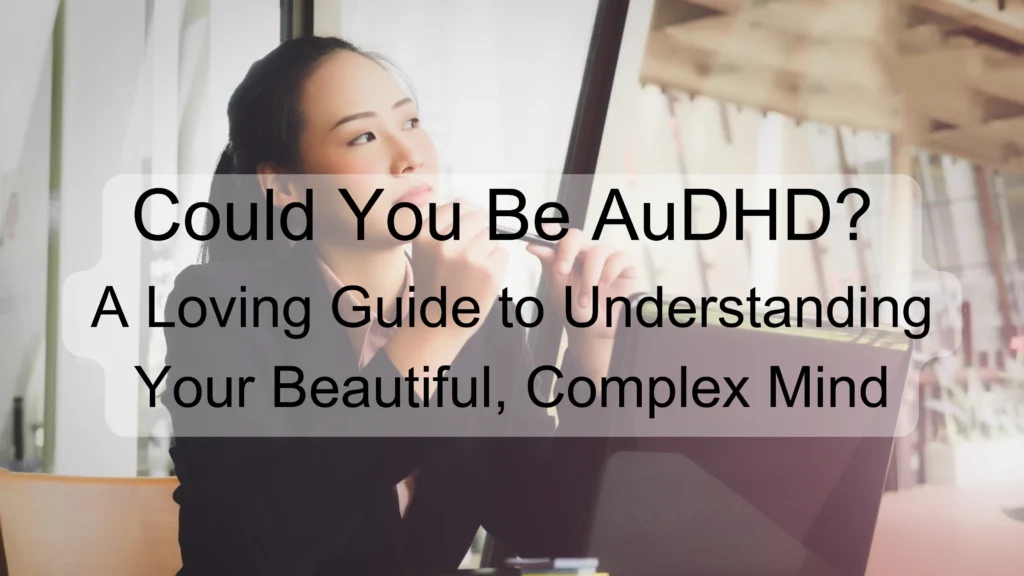Could You Be AuDHD? A Loving Guide to Understanding Your Beautiful, Complex Mind
A Loving Welcome
You may have just heard a term that hit something deep in your body: AuDHD.
It’s not a diagnosis (yet), but it is a real experience—a name that describes what it’s like to be both autistic and ADHD. You may feel a strange blend of grief and relief, or wonder if this explains parts of you you’ve spent a lifetime trying to fix, hide, or explain.
If that’s you—welcome. This space is for you.
So… What Is AuDHD?
AuDHD means that your brain is wired with a combination of both autism and ADHD traits. You may be:
- Highly sensitive and easily distracted,
- Emotionally intense and socially exhausted,
- Creative, caring, clever and chronically misunderstood.
You’re not broken. You’ve just been trying to live in a world that wasn’t built for your kind of brilliance.
What Might This Explain About You?
So many AuDHD people—especially women and those socialised to be “nice” or “good”—go through life unnoticed, undiagnosed, and often deeply lonely.
You might recognise yourself in these experiences:
- Masking: Hiding your true thoughts, needs, or reactions in social situations to avoid rejection.
- Sensory Issues: Feeling overwhelmed by loud sounds, bright lights, itchy clothes, or food textures.
- Burnout Cycles: Doing too much, crashing, disappearing, then repeating the cycle.
- Hyperfocus & Forgetfulness: Being incredibly focused on things you love, yet unable to remember appointments, keys, or conversations.
- Deep empathy—but a short fuse: You care deeply but may snap under pressure. (That’s not you being unkind—it’s your nervous system crying out.)
Why Didn’t I Know Sooner?
Many women with AuDHD don’t find out until adulthood—often not until menopause, motherhood, or burnout.
That’s because:
- The diagnostic criteria were designed around boys.
- You may have learned to over-function, over-give, and over-adapt.
- Society taught you to mask, please, and blend in—at great cost.
You likely became the caretaker, the achiever, the fixer… and forgot what it felt like to just be you.
What Happens Now?
You don’t have to rush into anything.
This isn’t about labelling—it’s about liberation. Understanding your neurodivergence gives you:
- A language for your lived experience,
- A map to navigate your needs,
- A doorway to community and compassion.
You don’t have to do it all alone anymore.
Some Beautiful Truths About You
You may feel raw right now. You may be rethinking your entire life story. That’s normal. And yet…
There is a powerful truth here:
You were never too much.
>You were never not enough.
>You were always wired for wonder.
Your ability to sense, to feel, to care deeply, to see patterns others miss—this is sacred. You are the sensitive instrument in a noisy world. And now, you’re learning to tune yourself instead of letting the world detune you.
Gentle Next Steps
Here are some kind and grounding things you can do:
- Rest. Discovering your neurodivergence can feel like a full-body recalibration.
- Read. Try books like Unmasking Autism by Devon Price, Divergent Mind by Jenara Nerenberg, or blogs by neurodivergent women.
- Connect. Follow neurodivergent creators, join a support group, or share your story with someone you trust.
- Reflect. Keep a journal. Write to your past self. Ask your nervous system what it needs.
- Get Support. Whether it’s therapy, coaching, or community—find a space where you don’t have to mask.
You Are Not Alone
If this resonates with you, know this: you’re not late. You’re right on time.
Whether or not you seek a formal diagnosis, this discovery is a kind of homecoming. A return to the self you may have hidden, denied, or over-edited to survive.
Now, you get to thrive.
A Blessing for Your Journey
To the one just waking up to the truth of who they are:
May this be the beginning of deep remembering.
May you release shame like old skin.
May your quirks become your compass.
And may you know, at last,
that your AuDHD brain is not a fault to fix—
but a frequency to tune in to.
For more insightful blogs, click here
Download your FREE Professional Cheat Sheet here

